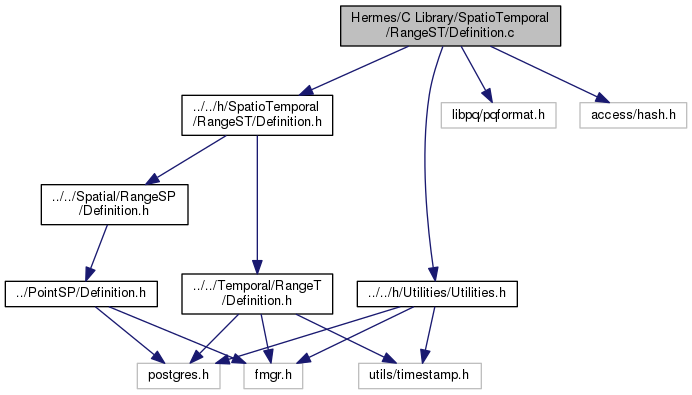|
Hermes
|
|
Hermes
|
The implementation of RangeST. More...
#include "../../h/SpatioTemporal/RangeST/Definition.h"#include "../../h/Utilities/Utilities.h"#include <libpq/pqformat.h>#include <access/hash.h>
Functions | |
| RangeST * | cloneRangeST (const RangeST *range, RangeST *result) |
| PGDLLEXPORT Datum | cloneRangeSTV1 (PG_FUNCTION_ARGS) |
| PG_FUNCTION_INFO_V1 (cloneRangeSTV1) | |
| RangeST * | constructorRangeST (const Interval *tr, Timestamp tc, int32 spr, int32 cx, int32 cy, RangeST *result, char **error) |
| PGDLLEXPORT Datum | constructorRangeSTV1 (PG_FUNCTION_ARGS) |
| PG_FUNCTION_INFO_V1 (constructorRangeSTV1) | |
| RangeST * | constructorHighRangeST (const RangeT *t, const RangeSP *sp, RangeST *result, char **error) |
| PGDLLEXPORT Datum | constructorHighRangeSTV1 (PG_FUNCTION_ARGS) |
| PG_FUNCTION_INFO_V1 (constructorHighRangeSTV1) | |
| RangeST * | inRangeST (const char *str, RangeST *result, char **error) |
| PGDLLEXPORT Datum | inRangeSTV1 (PG_FUNCTION_ARGS) |
| PG_FUNCTION_INFO_V1 (inRangeSTV1) | |
| char * | outRangeST (const RangeST *range) |
| PGDLLEXPORT Datum | outRangeSTV1 (PG_FUNCTION_ARGS) |
| PG_FUNCTION_INFO_V1 (outRangeSTV1) | |
| PGDLLEXPORT Datum | recvRangeST (PG_FUNCTION_ARGS) |
| PG_FUNCTION_INFO_V1 (recvRangeST) | |
| bytea * | RangeST2Bytea (const RangeST *range) |
| PGDLLEXPORT Datum | sendRangeST (PG_FUNCTION_ARGS) |
| PG_FUNCTION_INFO_V1 (sendRangeST) | |
| PGDLLEXPORT Datum | hashRangeST (PG_FUNCTION_ARGS) |
| PG_FUNCTION_INFO_V1 (hashRangeST) | |
| bool | equalsRangeST (const RangeST *rangeA, const RangeST *rangeB) |
| PGDLLEXPORT Datum | equalsRangeSTV1 (PG_FUNCTION_ARGS) |
| PG_FUNCTION_INFO_V1 (equalsRangeSTV1) | |
| PGDLLEXPORT Datum | getTRangeST (PG_FUNCTION_ARGS) |
| PG_FUNCTION_INFO_V1 (getTRangeST) | |
| PGDLLEXPORT Datum | getTrRangeST (PG_FUNCTION_ARGS) |
| PG_FUNCTION_INFO_V1 (getTrRangeST) | |
| PGDLLEXPORT Datum | getTcRangeST (PG_FUNCTION_ARGS) |
| PG_FUNCTION_INFO_V1 (getTcRangeST) | |
| PGDLLEXPORT Datum | getSpRangeST (PG_FUNCTION_ARGS) |
| PG_FUNCTION_INFO_V1 (getSpRangeST) | |
| PGDLLEXPORT Datum | getSprRangeST (PG_FUNCTION_ARGS) |
| PG_FUNCTION_INFO_V1 (getSprRangeST) | |
| PGDLLEXPORT Datum | getSpcRangeST (PG_FUNCTION_ARGS) |
| PG_FUNCTION_INFO_V1 (getSpcRangeST) | |
| PGDLLEXPORT Datum | getCxRangeST (PG_FUNCTION_ARGS) |
| PG_FUNCTION_INFO_V1 (getCxRangeST) | |
| PGDLLEXPORT Datum | getCyRangeST (PG_FUNCTION_ARGS) |
| PG_FUNCTION_INFO_V1 (getCyRangeST) | |
The implementation of RangeST.
These functions are documented in the RangeST/Definition.h
Referenced by cloneRangeSTV1().
| PGDLLEXPORT Datum cloneRangeSTV1 | ( | PG_FUNCTION_ARGS | ) |
| RangeST* constructorHighRangeST | ( | const RangeT * | t, |
| const RangeSP * | sp, | ||
| RangeST * | result, | ||
| char ** | error | ||
| ) |
References interval2seconds(), RangeSP::r, RangeT::r, RangeST::sp, and RangeST::t.
Referenced by constructorHighRangeSTV1().

| PGDLLEXPORT Datum constructorHighRangeSTV1 | ( | PG_FUNCTION_ARGS | ) |
| RangeST* constructorRangeST | ( | const Interval * | tr, |
| Timestamp | tc, | ||
| int32 | spr, | ||
| int32 | cx, | ||
| int32 | cy, | ||
| RangeST * | result, | ||
| char ** | error | ||
| ) |
References RangeSP::c, RangeT::c, interval2seconds(), RangeSP::r, RangeT::r, RangeST::sp, RangeST::t, PointSP::x, and PointSP::y.
Referenced by constructorRangeSTV1().

| PGDLLEXPORT Datum constructorRangeSTV1 | ( | PG_FUNCTION_ARGS | ) |
References RangeSP::c, RangeT::c, RangeSP::r, RangeT::r, RangeST::sp, RangeST::t, PointSP::x, and PointSP::y.
Referenced by equalsRangeSTV1().
| PGDLLEXPORT Datum equalsRangeSTV1 | ( | PG_FUNCTION_ARGS | ) |
| PGDLLEXPORT Datum getCxRangeST | ( | PG_FUNCTION_ARGS | ) |
| PGDLLEXPORT Datum getCyRangeST | ( | PG_FUNCTION_ARGS | ) |
| PGDLLEXPORT Datum getSpcRangeST | ( | PG_FUNCTION_ARGS | ) |
| PGDLLEXPORT Datum getSpRangeST | ( | PG_FUNCTION_ARGS | ) |
| PGDLLEXPORT Datum getSprRangeST | ( | PG_FUNCTION_ARGS | ) |
| PGDLLEXPORT Datum getTcRangeST | ( | PG_FUNCTION_ARGS | ) |
| PGDLLEXPORT Datum getTRangeST | ( | PG_FUNCTION_ARGS | ) |
| PGDLLEXPORT Datum getTrRangeST | ( | PG_FUNCTION_ARGS | ) |
| PGDLLEXPORT Datum hashRangeST | ( | PG_FUNCTION_ARGS | ) |
References asprintfHermes(), RangeSP::c, RangeT::c, interval2seconds(), RangeSP::r, RangeT::r, RangeST::sp, RangeST::t, PointSP::x, and PointSP::y.
Referenced by inRangeSTV1().

| PGDLLEXPORT Datum inRangeSTV1 | ( | PG_FUNCTION_ARGS | ) |
| char* outRangeST | ( | const RangeST * | range | ) |
References asprintfHermes(), RangeSP::c, RangeT::c, RangeSP::r, RangeT::r, RangeST::sp, RangeST::t, PointSP::x, and PointSP::y.
Referenced by outRangeSTV1().

| PGDLLEXPORT Datum outRangeSTV1 | ( | PG_FUNCTION_ARGS | ) |
| PG_FUNCTION_INFO_V1 | ( | cloneRangeSTV1 | ) |
| PG_FUNCTION_INFO_V1 | ( | constructorRangeSTV1 | ) |
| PG_FUNCTION_INFO_V1 | ( | constructorHighRangeSTV1 | ) |
| PG_FUNCTION_INFO_V1 | ( | inRangeSTV1 | ) |
| PG_FUNCTION_INFO_V1 | ( | outRangeSTV1 | ) |
| PG_FUNCTION_INFO_V1 | ( | recvRangeST | ) |
| PG_FUNCTION_INFO_V1 | ( | sendRangeST | ) |
| PG_FUNCTION_INFO_V1 | ( | hashRangeST | ) |
| PG_FUNCTION_INFO_V1 | ( | equalsRangeSTV1 | ) |
| PG_FUNCTION_INFO_V1 | ( | getTRangeST | ) |
| PG_FUNCTION_INFO_V1 | ( | getTrRangeST | ) |
| PG_FUNCTION_INFO_V1 | ( | getTcRangeST | ) |
| PG_FUNCTION_INFO_V1 | ( | getSpRangeST | ) |
| PG_FUNCTION_INFO_V1 | ( | getSprRangeST | ) |
| PG_FUNCTION_INFO_V1 | ( | getSpcRangeST | ) |
| PG_FUNCTION_INFO_V1 | ( | getCxRangeST | ) |
| PG_FUNCTION_INFO_V1 | ( | getCyRangeST | ) |
| bytea* RangeST2Bytea | ( | const RangeST * | range | ) |
References RangeSP::c, RangeT::c, RangeSP::r, RangeT::r, sendTimeOffsetHermes, sendTimestampHermes, RangeST::sp, RangeST::t, PointSP::x, and PointSP::y.
Referenced by hashRangeST(), and sendRangeST().
| PGDLLEXPORT Datum recvRangeST | ( | PG_FUNCTION_ARGS | ) |
References RangeSP::c, RangeT::c, getmsgTimeOffsetHermes, getmsgTimestampHermes, interval2seconds(), RangeSP::r, RangeT::r, RangeST::sp, RangeST::t, PointSP::x, and PointSP::y.

| PGDLLEXPORT Datum sendRangeST | ( | PG_FUNCTION_ARGS | ) |